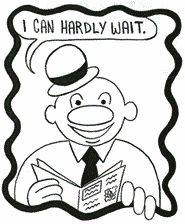Please, Please, Don’t Buy Me Another Tie:
I’m Fed Up with Hole-to-Hole Economics

by Hardly Waite, Gazette Senior Editor
November 22, 2001
A few Christmases ago, I was given a kettle, which now leaks. I could mend it, if only I could tighten the base. But one of the screws has a star-shaped slot with a spike in the middle, which is designed to prevent repairs, as no available tool will fit it. My kettle was for Christmas, not just for life. So I will throw it away, and help to build an earthly paradise by buying a new one.–George Monbiot.
The day following Thanksgiving is being promoted again this year by an international organization as “Buy Nothing Day.” The Gazette enthusiastically endorses Buy Nothing Day and urges its readers to participate by not joining the masses who, like Pavlov’s dogs, will respond to the first ringing of the Christmas bells by rushing, obedient and salivating, to the malls with credit cards in hand.
A few years ago, in an article called “The Gazette’s Great Water Article,” Gene Franks wrote:
Although we “average Americans” may think of ourselves as gentle folks, we are active participants in a cruel and unprecedented pillaging of the world that sustains us. We do not reflect that our unbridled consumerism is no accident. We are programmed to consume by schools, media, and tradition. Even the politicians we elect take on the role of detail men, sales reps for big business, today hawking drugs, tomorrow automobiles or a dam project in India. In the days of bustling economic growth after World War II, an American retailing expert named Victor Lebow proclaimed: “Our enormously productive economy demands that we make consumption our way of life, that we convert the buying and use of goods into rituals, that we seek our spiritual satisfaction, our ego satisfaction, in consumption. We need things consumed, burned up, worn out, replaced, and discarded at an ever-increasing rate.’”
Lebow, of course, would be very proud of us.
But perhaps we should reflect on whether we are satisfied with the role they are casting us in. Didn’t it make you a little angry to be asked, for the sake of our country, to do nothing more than go out and buy something?
The idea that our obligation is to consume is based in the notion–a bizarre notion when you really pause to take thought–that we can somehow consume our way to happiness. That if we can only consume enough, we will eventually live in a world of plenty. Doublespeak indeed. George Monbiot has summed up this view of world economics nicely. I call his system “hole-to-hole” economics. He writes:
The modern industrial economy works like this: resources are dug from a hole in the ground on one side of the planet, used for a few weeks, then dumped in a hole on the other side of the planet. This is known as the Creation of Value. The Creation of Value improves our quality of life. Improvements in our quality of life make us happier. The more we transfer from hole to hole, the happier we become.
That this hole-to-hole transfer plan isn’t working too well should be apparent from the growing gap between haves and have-nots. Even the elites at the top of the heap who reap the benefits don’t seem very happy. They always seem to need more and more, so they keep spurring us on to ever greater levels of consumption. I once read that one of the Rockefellers, David, I think, if he never slept and devoted 24/7 to spending his money, and if he could spend at the rate of $29,000 per minute, would never be able to spend his wealth. Nevertheless, he was working a fitful 17-hour-day in an effort to amass greater wealth. It’s hard to rest when there are resources to be moved from one hole to another. George Monbiot continues:
Unfortunately, we are not yet transferring enough. According to the Worldwatch Institute, we have used more goods and services since 1950 than in all the rest of human history. But we still don’t seem to be happy. Indeed, over the same period, 25-year-olds in Britain have become ten times more likely to be afflicted by depression. One in four British adults now suffers from a chronic lack of sleep, and one fifth of schoolchildren have psychological problems. Over the past 13 years, mental health insurance claims have risen by 36 per cent. American studies suggest that between 40 and 60 per cent of the population suffers from mental illness in any one year. The World Health Organisation predicts that by 2010 depression will become the second commonest disease in the developed world. Unless we start consuming in earnest, we’ll never experience real joy.
Never before have we been given such an overt, unblushing mandate to consume. What can I do for my country? Go shopping. Take a plane trip. Buy a new automobile. Conservation, which we at least talked about in the 1970s, has become a dirty word in the current American political arena. Gluttonous over-consumption is now synonymous with patriotism.
Maybe this time of change we are experiencing is the time when the mad spiral of consumerism we’ve been caught in should stop. Surely our generation has more to contribute than the consumption of trinkets.
Please don’t buy me another tie. I have plenty. I also have plenty of cute tee shirts and baseball caps with funny sayings and electronic marvels that do all the things I don’t want to do. And please don’t buy me, or yourself or anyone else, a leaf blower. Show some self respect.
When they ring the golden bells of Christmas, please don’t salivate.
You can learn more about Buy Nothing Day at http://www.buynothingday.co.uk/
You can read Shirley Wilkes Johnson’s article here on the Gazette website.
You can read “The Gazette’s Great Water Article” here.




![spendforamerica[1]](http://purewatergazette.net/blog/wp-content/uploads/2012/04/spendforamerica1.jpg)
![xmasshopper[1]](http://purewatergazette.net/blog/wp-content/uploads/2012/05/xmasshopper1.jpg)
![whithergoesthoureduced[1]](http://purewatergazette.net/blog/wp-content/uploads/2012/05/whithergoesthoureduced1.jpg)
